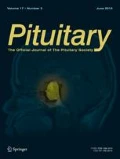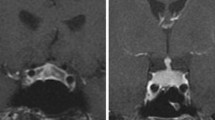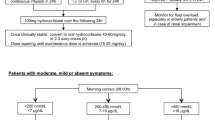Abstract
Anti-cytotoxic T-lymphocyte antigen-4 (CTLA-4) therapies represent a novel approach to cancer treatment via disruption of immune tolerance to antigens located on tumor cells. Disruption of immune tolerance, however, may occur at a cost. A host of immune related adverse events (IRAEs) are associated with anti-CTLA-4 therapy. Autoimmune hypophysitis has been reported in up to 17% of patients with melanoma and renal cell carcinoma treated with this therapy. Familiarity with the spectrum of IRAEs connected to these therapies is paramount for endocrinologists, oncologists and those involved in the care of these subjects. We review here key aspects of diagnosis and treatment of anti-CTLA-4 antibody therapy resultant IRAEs. We describe the first two cases of hypopituitarism in prostate cancer subjects undergoing experimental therapy with ipilimumab. The clinical evidence strongly suggests that the prostate cancer subjects developed autoimmune hypophysitis as a consequence of anti-CTLA-4 treatment. High dose glucocorticoid treatment resulted in markedly improved symptoms, and resolution of focal symptoms and diabetes insipidus. One subject recovered pituitary-thyroid axis function after 9 months; however, both continue to require GC replacement. These cases highlight the importance of early screening and treatment for hypopituitarism in all subjects undergoing treatment with anti-CTLA-4 therapy to prevent a potentially fatal outcome from secondary adrenal insufficiency, a readily treatable disease. We recommend mandatory long term follow-up to monitor the development of other hormonal deficits.



Similar content being viewed by others
References
Tivol EA, Borriello F, Schweitzer AN, Lynch WP, Bluestone JA, Sharpe AH (1995) Loss of CTLA-4 leads to massive lymphoproliferation and fatal multiorgan tissue destruction, revealing a critical negative regulatory role of CTLA-4. Immunity 3:541–547
Waterhouse P, Penninger JM, Timms E, Wakeham A, Shahinian A, Lee KP, Thompson CB, Griesser H, Mak TW (1995) Lymphoproliferative disorders with early lethality in mice deficient in Ctla-4. Science 270:985–988
van Elsas A, Hurwitz AA, Allison JP (1999) Combination immunotherapy of B16 melanoma using anti-cytotoxic T lymphocyte-associated antigen 4 (CTLA-4) and granulocyte/macrophage colony-stimulating factor (GM-CSF)-producing vaccines induces rejection of subcutaneous and metastatic tumors accompanied by autoimmune depigmentation. J Exp Med 190:355–366
Hurwitz AA, Yu TF, Leach DR, Allison JP (1998) CTLA-4 blockade synergizes with tumor-derived granulocyte-macrophage colony-stimulating factor for treatment of an experimental mammary carcinoma. Proc Natl Acad Sci USA 95:10067–10071
Hurwitz AA, Foster BA, Kwon ED, Truong T, Choi EM, Greenberg NM, Burg MB, Allison JP (2000) Combination immunotherapy of primary prostate cancer in a transgenic mouse model using CTLA-4 blockade. Cancer Res 60:2444–2448
Leach DR, Krummel MF, Allison JP (1996) Enhancement of antitumor immunity by CTLA-4 blockade. Science 271:1734–1736
Houot R, Levy R (2009) T-cell modulation combined with intratumoral CpG cures lymphoma in a mouse model without the need for chemotherapy. Blood 113:3546–3552
Jinushi M, Hodi FS, Dranoff G (2006) Therapy-induced antibodies to MHC class I chain-related protein A antagonize immune suppression and stimulate antitumor cytotoxicity. Proc Natl Acad Sci 103:9190–9195
Contardi E, Palmisano GL, Tazzari PL, Martelli AM, Fala F, Fabbi M, Kato T, Lucarelli E, Donati D, Polito L, Bolognesi A, Ricci F, Salvi S, Gargaglione V, Mantero S, Alberghini M, Ferrara GB, Pistillo MP (2005) CTLA-4 is constitutively expressed on tumor cells and can trigger apoptosis upon ligand interaction. Int J Cancer 117:538–550
Attia P, Phan GQ, Maker AV, Robinson MR, Quezado MM, Yang JC, Sherry RM, Topalian SL, Kammula US, Royal RE, Restifo NP, Haworth LR, Levy C, Mavroukakis SA, Nichol G, Yellin MJ, Rosenberg SA (2005) Autoimmunity correlates with tumor regression in patients with metastatic melanoma treated with anti-cytotoxic T-lymphocyte antigen-4. J Clin Oncol 23:6043–6053
Chung KY, Gore I, Fong L, Venook A, Dorazio P, Healey D, Pavlov D, Saltz LB (2007) A phase II study of the anti-CTLA4 monoclonal antibody (mAb), CP-675, 206,in patients with refractory metastatic adenocarcinoma of the colon or rectum. J Clin Oncol 25:3035 (Meeting Abstracts)
Davis TA, Tchekmedyian S, Korman A, Keler T, Deo Y, Small EJ (2002) MDX-010 (human anti-CTLA4): a phase 1 trial in hormone refractory prostate carcinoma (HRPC). Proc Am Soc Clin Oncol 21:74
Fischkoff SA, Hersh E, Weber J, Powderly J, Khan K, Pavlick A, Samlowski W, O’Day S, Nichol G, Yellin M (2005) Durable responses and progression-free survival observed in a phase II study of MDX-010 alone or in combination with dacarbazine (DTIC) in metastatic melanoma. J Clin Oncol 23:7525 (Meeting Abstracts)
Fong L, Kavanagh B, Rini BI, Shaw V, Weinberg V, Small EJ (2006) A phase I trial of combination immunotherapy with CTLA-4 blockade and GM-CSF in hormone-refractory prostate cancer. J Clin Oncol 24:2508 (Meeting Abstracts)
Hodi FS, Mihm MC, Soiffer RJ, Haluska FG, Butler M, Seiden MV, Davis T, Henry-Spires R, MacRae S, Willman A, Padera R, Jaklitsch MT, Shankar S, Chen TC, Korman A, Allison JP, Dranoff G (2003) Biologic activity of cytotoxic T lymphocyte-associated antigen 4 antibody blockade in previously vaccinated metastatic melanoma and ovarian carcinoma patients. Proc Natl Acad Sci USA 100:4712–4717
Morton DL, Mozzillo N, Thompson JF, Kelley MC, Faries M, Wagner J, Schneebaum S, Schuchter L, Gammon G, Elashoff R, Group MCT (2007) An international, randomized, phase III trial of bacillus Calmette-Guerin (BCG) plus allogeneic melanoma vaccine (MCV) or placebo after complete resection of melanoma metastatic to regional or distant sites. J Clin Oncol 25:8508 (Meeting Abstracts)
Phan GQ, Yang JC, Sherry RM, Hwu P, Topalian SL, Schwartzentruber DJ, Restifo NP, Haworth LR, Seipp CA, Freezer LJ, Morton KE, Mavroukakis SA, Duray PH, Steinberg SM, Allison JP, Davis TA, Rosenberg SA (2003) Cancer regression and autoimmunity induced by cytotoxic T lymphocyte-associated antigen 4 blockade in patients with metastatic melanoma. Proc Natl Acad Sci USA 100:8372–8377
Ribas A, Camacho LH, Lopez-Berestein G, Pavlov D, Bulanhagui CA, Millham R, Comin-Anduix B, Reuben JM, Seja E, Parker CA, Sharma A, Glaspy JA, Gomez-Navarro J (2005) Antitumor activity in melanoma and anti-self responses in a phase I trial with the anti-cytotoxic T lymphocyte-associated antigen 4 monoclonal antibody CP-675, 206. J Clin Oncol 23:8968–8977
Thompson RH, Allison JP, Kwon ED (2006) Anti-cytotoxic T lymphocyte antigen-4 (CTLA-4) immunotherapy for the treatment of prostate cancer. Urol 24:442–447
Weber JS, Targan S, Scotland R, Snively J, Garcia M, Yellin M, Fischkoff S, Nicho l (2006) Phase II trial of extended dose anti-CTLA-4 antibody ipilimumab (formerly MDX-010) with a multi-peptide vaccine for resected stages IIIC and IV melanoma. J Clin Oncol 24: 2510 (Meeting Abstracts)
Yang JC, Beck KE, Blansfield JA, Tran KQ, Lowy I, Rosenberg SA (2005) Tumor regression in patients with metastatic renal cancer treated with a monoclonal antibody to CTLA4 (MDX-010). J Clin Oncol 23:2501 (Meeting Abstracts)
Blansfield JA, Beck KE, Tran K, Yang JC, Hughes MS, Kammula US, Royal RE, Topalian SL, Haworth LR, Levy C, Rosenberg SA, Sherry RM (2005) Cytotoxic T-lymphocyte-associated antigen-4 blockage can induce autoimmune hypophysitis in patients with metastatic melanoma and renal cancer. J Immunother 28:593–598
Downey SG, Klapper JA, Smith FO, Yang JC, Sherry RM, Royal RE, Kammula US, Hughes MS, Allen TE, Levy CL, Yellin M, Nichol G, White DE, Steinberg SM, Rosenberg SA (2007) Prognostic factors related to clinical response in patients with metastatic melanoma treated by CTL-associated antigen-4 blockade. Clin Cancer Res 13:6681–6688
Gordon IO, Wade T, Chin K, Dickstein J, Gajewski TF (2009) Immune-mediated red cell aplasia after anti-CTLA-4 immunotherapy for metastatic melanoma Cancer. Immunol Immunother 58:1351–1353
Maker AV, Phan GQ, Attia P, Yang JC, Sherry RM, Topalian SL, Kammula US, Royal RE, Haworth LR, Levy C, Kleiner D, Mavroukakis SA, Yellin M, Rosenberg SA (2005) Tumor regression and autoimmunity in patients treated with cytotoxic T lymphocyte-associated antigen 4 blockade and interleukin 2: a phase I/II study. Ann Surg Oncol 12:1005–1016
Maker AV, Yang JC, Sherry RM, Topalian SL, Kammula US, Royal RE, Hughes M, Yellin MJ, Haworth LR, Levy C, Allen T, Mavroukakis SA, Attia P, Rosenberg SA (2006) Intrapatient dose escalation of anti-CTLA-4 antibody in patients with metastatic melanoma. J Immunother 29:455–463
Small EJ, Tchekmedyian NS, Rini BI, Fong L, Lowy I, Allison JP (2007) A pilot trial of CTLA-4 blockade with human anti-CTLA-4 in patients with hormone-refractory prostate cancer. Clin Cancer Res 13:1810–1815
Weber JS, O’Day S, Urba W, Powderly J, Nichol G, Yellin M, Snively J, Hersh E (2008) Phase I/II study of ipilimumab for patients with metastatic melanoma. J Clin Oncol 26:5950–5956
Yang JC, Hughes M, Kammula U, Royal R, Sherry RM, Topalian SL, Suri KB, Levy C, Allen T, Mavroukakis S, Lowy I, White DE, Rosenberg SA (2007) Ipilimumab (anti-CTLA4 antibody) causes regression of metastatic renal cell cancer associated with enteritis and hypophysitis. J Immunother 30:825–830
Simmons AD, Moskalenko M, Creson J, Fang J, Yi S, VanRoey MJ, Allison JP, Jooss K (2008) Local secretion of anti-CTLA-4 enhances the therapeutic efficacy of a cancer immunotherapy with reduced evidence of systemic autoimmunity. Cancer Immunol Immunother 57:1263–1270
Weber J (2007) Review: anti-CTLA-4 antibody ipilimumab: case studies of clinical response and immune-related adverse events. Oncologist 12:864–872
Caturegli P, Lupi I, Landek-Salgado M, Kimura H, Rose NR (2008) Pituitary autoimmunity: 30 years later Autoimmunity. Reviews 7:631–637
Abe T (2008) Lymphocytic infundibulo-neurohypophysitis and infundibulo-panhypophysitis regarded as lymphocytic hypophysitis variant. Brain Tumor Pathol 25:59–66
Abe T, Matsumoto K, Sanno N, Osamura Y (1995) Lymphocytic hypophysitis: case report. Neurosurgery 36:1016–1019
Beressi N, Beressi JP, Cohen R, Modigliani E (1999) Lymphocytic hypophysitis. A review of 145 cases. Ann Med Interne (Paris) 150:327–341
Laws ER, Vance ML, Jane JA Jr (2006) Hypophysitis. Pituitary 9:331–333
Leung GK, Lopes MB, Thorner MO, Vance ML, Laws ER, Jr (2004) Primary hypophysitis: a single-center experience in 16 cases. J Neurosurg 101:262–271
Rivera JA (2006) Lymphocytic hypophysitis: disease spectrum and approach to diagnosis and therapy. Pituitary 9:35–45
Tubridy N, Saunders D, Thom M, Asa SL, Powell M, Plant GT, Howard R (2001) Infundibulohypophysitis in a man presenting with diabetes insipidus and cavernous sinus involvement. J Neurol Neurosurg Psychiatry 71:798–801
McIntyre EA, Perros P (2007) Fatal inflammatory hypophysitis. Pituitary 10:107–111
Ward L, Paquette J, Seidman E, Huot C, Alvarez F, Crock P, Delvin E, Kampe O, Deal C (1999) Severe autoimmune polyendocrinopathy-candidiasis-ectodermal dystrophy in an adolescent girl with a novel AIRE mutation: response to immunosuppressive therapy. J Clin Endocrinol Metab 84:844–852
Acknowledgments
The authors thank Shirley McCartney, Ph.D., for editorial assistance, and Andy Rekito, MS, for assistance with digital imaging.
Author information
Authors and Affiliations
Corresponding author
Rights and permissions
About this article
Cite this article
Dillard, T., Yedinak, C.G., Alumkal, J. et al. Anti-CTLA-4 antibody therapy associated autoimmune hypophysitis: serious immune related adverse events across a spectrum of cancer subtypes. Pituitary 13, 29–38 (2010). https://doi.org/10.1007/s11102-009-0193-z
Received:
Accepted:
Published:
Issue Date:
DOI: https://doi.org/10.1007/s11102-009-0193-z




